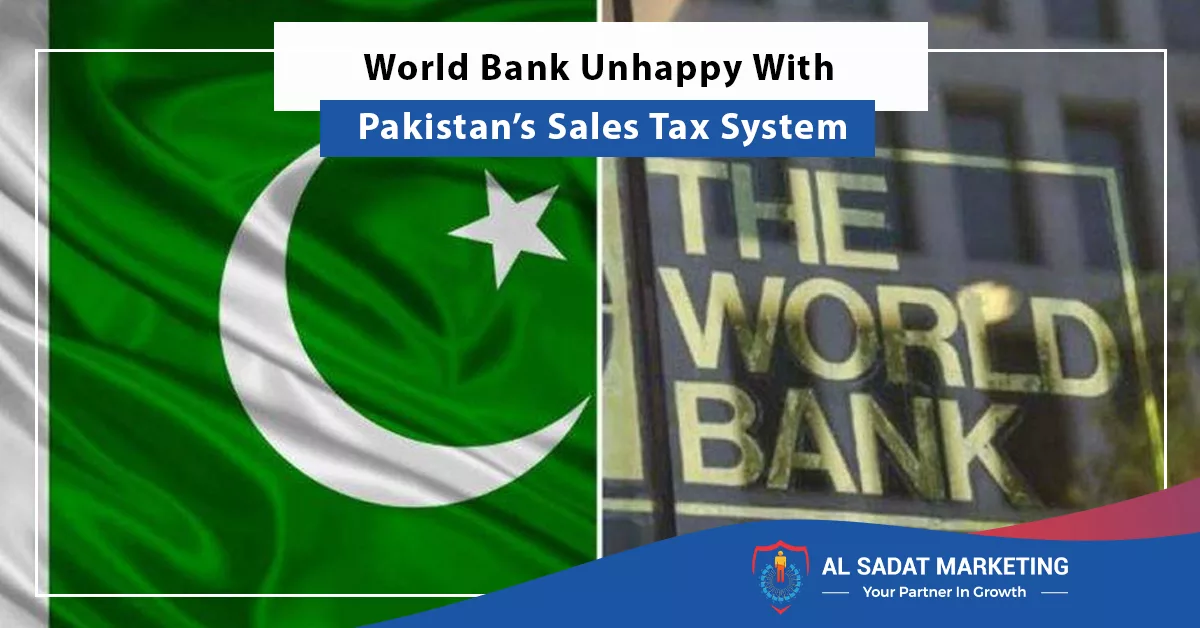The World Bank has raised grave worry over Pakistan’s sales tax regime, which permits concessionary rates below the standard 18 per cent for specific goods and industries.
The sales tax system permits some domestic items to be zero-rated, which further reduces the revenue base, according to the WB’s most recent report, World Bank Pakistan Development Update (PDU).
Multiple exemptions are allowed within the limited scope of the GST base definition. Concessionary rates below the regular 18 per cent are possible under the sales tax system for specific goods and industries. Additionally, it permits some household supplies to be zero-rated, significantly reducing the tax base.
Read More: World Bank Urges High Excise Duty on Cigarette for Tax Revenue
The tax system in Pakistan is complicated, has a small revenue base, and high tax rates. Numerous special provisions, reduced rates, exemptions, and, to some extent, unconventional approaches to tax policy are all part of the tax system. Many of these policy decisions were made in an effort to strike a balance between the requirement to maintain a minimum level of tax collection and the need to provide financial support to particular organizations or businesses. According to the report, this has led to a complicated system with several vested interests and a loss of economic productivity and revenue.
11.6 per cent of Pakistan’s GDP was made up of total revenues in FY23, with 92 per cent of those coming from the federal level and the rest coming from the province level. In FY23, the tax-to-GDP ratio was only 10.2%. Even though Pakistan’s tax performance increased between FY11 and FY18, growing from a low of 8.6% of GDP in FY11 to a high of 11.4 per cent in FY18, it still falls short of the minimum required tax revenue for developing countries, which is 15% of GDP.
Tax and non-tax revenue both decreased by 0.2 percentage points, bringing the total revenue from 12.1 per cent of GDP in FY22 to 11.6 per cent of GDP in FY23. From 6.3 per cent of GDP in FY22 to 5.2 per cent of GDP in FY23, indirect tax income, which includes a sales tax on products and services, customs duties, and excise duties, decreased. The main reason for this was a decrease in imports, which resulted in less money coming in through sales taxes and customs levies on imported items.
Read More: World Bank Thinks Pakistan is Still Not Taxing People Enough
On the other hand, the PDL and direct taxes brought in more money during the year. PDL revenues climbed to PKR 580 billion, or over 4.5 times more than in FY22 after the PDL was raised from zero to PKR 50 per litre.28 WB noted that adjustments to tax policy measures, such as adjustments to income tax rates, a super tax on banks and non-bank enterprises, and increased property taxes, contributed to the increase in direct tax collection.
You can also invest in other famous and most in demand housing societies, such as , Blue World City, Rudn Enclave, 7 Wonders City Peshawar, Taj Residencia, Kingdom Valley, New Metro City Gujar Khan, Forest Town Rawalpindi, University Town Rawalpindi, ICHS Town, Park View City Islamabad, Multi Gardens B17 Islamabad and Nova City Islamabad.
Al Sadat Marketing please contact 0331 1110005 or visit https://alsadatmarketing.com/
Few more real estate housing schemes which are trending now a days in Islamabad by including: Faisal Town Phase 2, Prism Town Gujar Khan, New City Paradise, Eighteen Islamabad, 7 Wonders City Islamabad, Capital Smart City, Silver City Islamabad, The Life Residencia, Faisal Town Islamabad, Islamabad Golf City, Islamabad Model Town and Marble Arch Enclave.
Al Sadat Marketing is an emerging Real Estate Agency headquartered in Islamabad, Pakistan. With over 10+ Years of experience, Al Sadat Marketing is providing its services and dealing all trending housing societies projects in different cities of Pakistan. Islamabad Projects, Rawalpindi Projects, Gujar Khan Projects, Burhan Projects, and Peshawar Projects etc.
Book Your Plot Now: +92 331 111 0005










